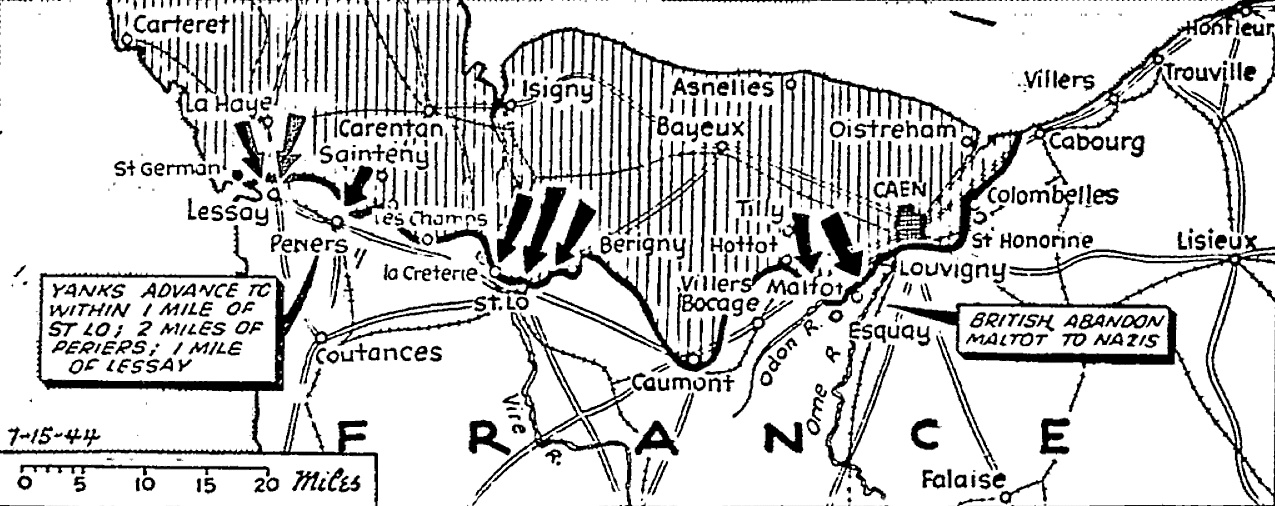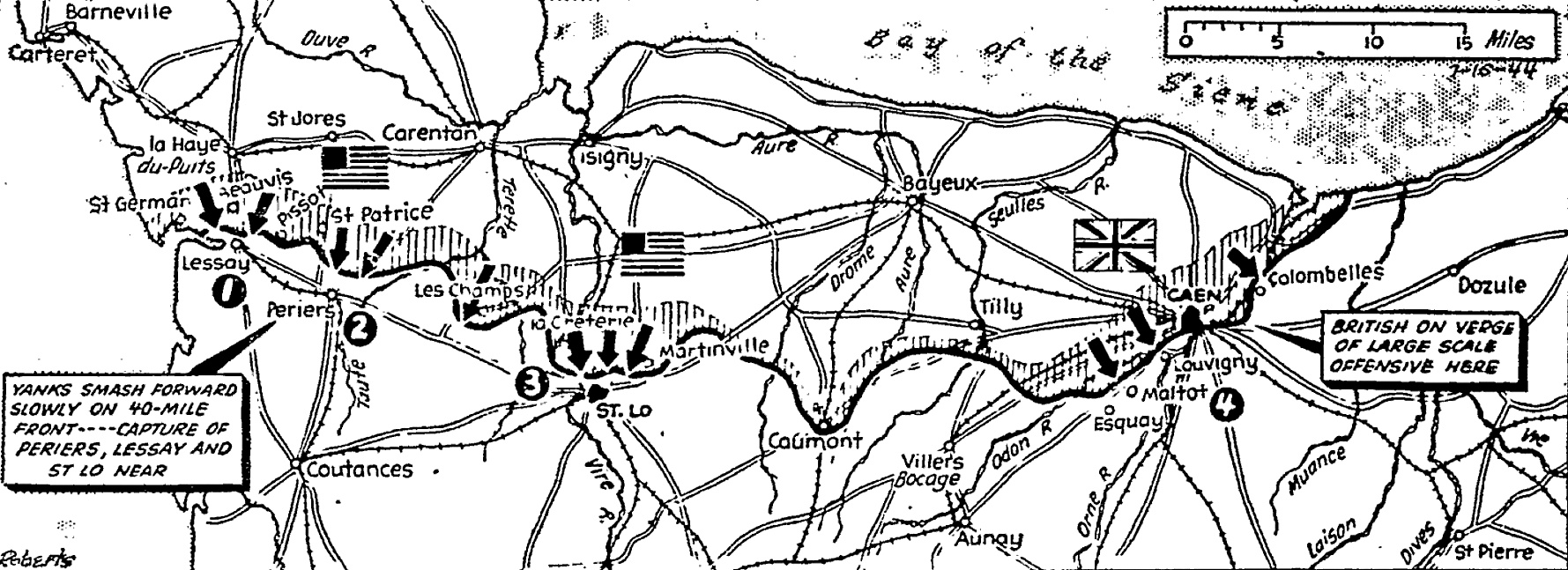As Nazi bullets fly –
Wolfert: Hedge across field seems lifetime away – and is for some
‘They ain’t gonna shoot at you,’ 2nd Looie tells his men, but he was wrong
By Ira Wolfert, North American Newspaper Alliance
With U.S. infantry outside Saint-Lô, France – (July 12, delayed)
American troops find the Normandy farmer frugal around here. His fields are mostly less than an acre and boxed in by high hedges as if they were treasures he wanted to lock up.
He’s got them locked up tight for the hedges are thick and green and all brambly. You can’t see through them if you stick your face into them to look through. It’s like trying to look through a mask.
Under every hedge is a German slit trench – one, three or five of them, dug right into the roots of the hedges. Men who know a great deal about war built them.
A battalion today was driving due south on Saint-Lô and there were German ahead of them and on two sides of them, waiting behind hedges in every field with mortars, machine guns, rifles and machine pistols. A lieutenant would say a four-letter word. He chose the same one every time not because he liked it but because his mind was too numbed to think up a new one.
‘Ain’t gonna shoot’
“There ain’t nobody gonna shoot at you,” he said. He lifted himself out of the slit earth where he had been hiding and hauled himself through a hedge, putting his arms in front of his face to keep the thorns out. His platoon would lift and haul with him and they’d be out in an open field.
It felt terrible there. Everybody would feel all naked with the timothy and American style clover and grass reaching no higher than the leggings. The fellows would think. “Shavetail, you’ve gonna be a dead little boy if you ain’t right about nobody shooting at us.”
Platoons in the fields to the right and left would be coming through hedges and advancing at the same time, no doubt thinking the same thing about their second looies. It felt good in the thick hedges at the edge of the open field. When you are in a battle, it is hard to think that anything exists anywhere except the battle.
Best place in world
About two hours ago there as I wrote, it seemed to me there was no better place in the world to be than in those hedges. Cannon and mortar shells would pass over your head. The trajectory was in your favor. You knew that they couldn’t hit you unless you had bad luck and one fell right on your head.
That was why there were still Germans in the hedges. Our artillery couldn’t drive them the conventional six feet under, unless it hit each one separately on the head.
A couple of pigs were grunting and gobbling as they grubbed in the fields and the fellow next to me, finding his brains breathing again, said, “Look, pork chops.” Funny looking French birds were fluttering away from every shell whistle, giving off soft, wet warbles as if they were clearing their throats. Only it sounded beautiful.
Afraid fall silent
There wasn’t much talking in the hedges. Most of the fellows when afraid fall silent. Only one in about every ten becomes talkative. Words come out of him in a steady, high, irritating babble. He tries to talk out the fears silently inside and edge away from the talkative one.
Mostly what you heard in the hedges was the flat and wiry-seeming sound of shallow breathing. Lungs don’t work very well when a man is afraid and breath becomes very short. Then the lieutenant said his four-letter word and fellow lifted up and scraped and tore their awkward way through hedges.
After that they stood on the soft grass and there was nothing between them and the enemy’s bullets except the warm, summer air. So thin that air was. It seemed that the fellows looked across maybe a hundred feet of grass to another hedge just like the one they had left. Only there were Germans in that hedge.
Like a sore thumb
Everybody felt naked standing there. You felt you were sticking up like a sore thumb, waiting to be banged again by a hammer. The hedge across the field seemed a lifetime away for some of the fellows. That’s just what it was – their lives ended before they made the once-mighty German Reichswehr a broken thing.
It’s not putting up what you might call, if you weren’t in it, a really serious fight. It’s more than a rearguard action in this sector. Some of the Huns seem to want to surrender, but in every hedge, there is some tough, wise, old cookie. A horny-hearted veteran of long years of war, who fires his weapon until you come right up to him and tap him on the shoulder. He is likely to have his toilet kit all neatly wrapped up in a handkerchief, sitting beside him in a slit trench, waiting for a trip to prison camp. Then when you come right up to his hedge, he steps away from the Huns and says: “Kamerad”. If the marksmanship has been bad across that field, he’s got a chance of being taken prisoner.
Always some leftovers
All the same, there continues to be, day after day, one or five or eight of those guys, leftovers of our artillery and mortar fire, still in there trying. They sit directly in front of us or they sit in hedges to the right and left and when the guys in our faces are shooting good at us, the guys to the right and left hold still and wait until we have passed and then try to get us in the back.
The race across the open field goes fast for a platoon that’s not being shot at. In other places, platoons drop and belly their way forward trying to grenade the Nazis out. Everybody shoots everything he has and there is a fearful racket.
The first platoon to gain the German hedge runs enfilading fire on the hedges in the fields on both sides of it and other platoons come up under their protection, crouching and running fast and throwing themselves into their hedges with the thud and thump of a football team smashing a line.
That way the battalion advances and that way the whole of civilization advances on Saint-Lô, a French town that nobody I know of ever heard of until a few weeks ago.

